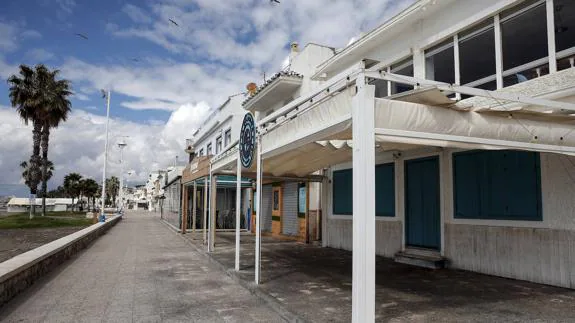Lockdown estimated to cost the Costa del Sol's restaurant sector 270 million euros
Some 80,000 people have been left without work and the absence of tourists and obligatory social distancing will mean this sector's recovery from the coronavirus crisis will be slower
JUAN Soto
Martes, 14 de abril 2020, 15:53
Juan Manuel Buri has just had to temporaily lay off 150 employees. The current state of alarm caught him by surprise, as it did almost everybody, with storerooms full of supplies and a large staff preparing for the start of the forthcoming peak season for the hotel and restaurant sector.
Buri, one of the owners of Casa Lola, a chain of five restaurants between Malaga and Marbella, is aware that nothing will be the same when this health crisis is over, especially in his business. The absence of tourists and the need for social distancing measures which will have to be implemented before normality returns, are going to make recovery especially difficult for a sector which is already predicting losses of millions of euros on the Costa del Sol.
Beyond the uncertainty of not knowing when they can reopen, the drama for the restaurant sector can be summed up by the cold, hard numbers: business owners estimate about 270 million euros in losses and 80,000 people are currently without work in the province of Malaga. In fact the bar and restaurant sector accounts for about 30 per cent of all the ERTEs (the scheme which allows employers to temporarily lay off staff) registered in Andalucía.
According to the most optimistic calculations by the restaurant association in Malaga province, bars and restaurants will be the last to recover from the coronavirus crisis and it will be at least six months before they see their premises and outside terraces full again.
Juan Manuel Buri believes that Spain and the other countries affected are going to follow the same steps as China, where normal activity has still not resumed despite the restrictions starting at the beginning of the year. He explains that his sister-in-law lives in Hong Kong and restaurants there have had to restrict the number of customers by 50 per cent and are not permitted to seat more than four people at a table. "2020 is already lost. I would settle for not losing more money for the rest of the year," he says.
For Javier Frutos, president of the Mahos association, the real problem is not knowing when or how activity will resume. Like the vast majority of professionals in this sector, he knows turnover is going to be badly affected and warns that numerous companies are going to suffer badly.
"Some companies aren't going to get through this, especially small businesses, those with a large staff or that have to pay high rents," he says.
This businessman, who is also a partner in several businesses in Malaga city centre - Mesón Cantarranas, Taberna El Mentidero, La Abacería and the Y Dice Matías pizzería - believes that businesses will manage for the first few months after lockdown thanks to the ICO credits for entrepreneurs, but he warns that if the government doesn't waive taxes many will have to close down.
"If they only delay payment of taxes and people then have to repay the loans, their staff and the taxes, they are going to create a situation that many won't be able to cope with," he says.
Another business owner affected by the lack of tourists on the Costa del Sol is Thomas Weller, a Canadian businessman with seven restaurants in Mijas, including Aroma Café & Secret Garden, Tapintxos and Latitud 36, among others.
He explains that the area normally relies on Asian tourism for much of the year, so the coronavirus alert has meant they practically stopped working at the start of 2020.
"The Chinese New Year is a very important time for us and this year we have lost it completely," he says.
He also believes this summer will have to be written off and admits he would be pleased to start working again in September or October.
"If we recover 50 per cent of Chinese tourists for next year, it will be great news," he says. "This is going to be like a wheel, and the speed at which we recover will depend on what we all contribute between us: businesses, employees, owners of premises and the government."
The 'chiringuito' beach restaurants are also reliant on tourism and they are extremely worried by this crisis. The president of the association of beach businesses in Malaga, Manuel Villafaina, says this is a profound crisis for the sector, because "even though a business is closed, it still generates expenses".
Like the others, he believes this year is lost and that the only solution will be to apply for loans.
"Next year, we will have to start from scratch," he says.
For Pablo Gonzalo, who runs El Pimpi, one of Malaga's iconic bars for tourists, the immediate future is going to mean attracting local people and tourists from other parts of Spain.
Before the crisis began, around 50 per cent of the clients in this city centre establishment were from outside Malaga, so he believes it is essential to adapt to the circumstances.
"We business owners have to press the 're-set' button and start the battle from zero," he says.
